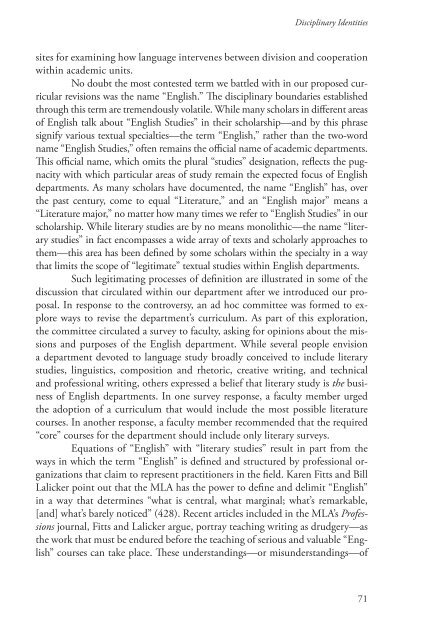Design Discourse - Composing and Revising Programs in Professional and Technical Writing, 2010a
Design Discourse - Composing and Revising Programs in Professional and Technical Writing, 2010a
Design Discourse - Composing and Revising Programs in Professional and Technical Writing, 2010a
You also want an ePaper? Increase the reach of your titles
YUMPU automatically turns print PDFs into web optimized ePapers that Google loves.
Discipl<strong>in</strong>ary Identities<br />
sites for exam<strong>in</strong><strong>in</strong>g how language <strong>in</strong>tervenes between division <strong>and</strong> cooperation<br />
with<strong>in</strong> academic units.<br />
No doubt the most contested term we battled with <strong>in</strong> our proposed curricular<br />
revisions was the name “English.” The discipl<strong>in</strong>ary boundaries established<br />
through this term are tremendously volatile. While many scholars <strong>in</strong> different areas<br />
of English talk about “English Studies” <strong>in</strong> their scholarship—<strong>and</strong> by this phrase<br />
signify various textual specialties—the term “English,” rather than the two-word<br />
name “English Studies,” often rema<strong>in</strong>s the official name of academic departments.<br />
This official name, which omits the plural “studies” designation, reflects the pugnacity<br />
with which particular areas of study rema<strong>in</strong> the expected focus of English<br />
departments. As many scholars have documented, the name “English” has, over<br />
the past century, come to equal “Literature,” <strong>and</strong> an “English major” means a<br />
“Literature major,” no matter how many times we refer to “English Studies” <strong>in</strong> our<br />
scholarship. While literary studies are by no means monolithic—the name “literary<br />
studies” <strong>in</strong> fact encompasses a wide array of texts <strong>and</strong> scholarly approaches to<br />
them—this area has been def<strong>in</strong>ed by some scholars with<strong>in</strong> the specialty <strong>in</strong> a way<br />
that limits the scope of “legitimate” textual studies with<strong>in</strong> English departments.<br />
Such legitimat<strong>in</strong>g processes of def<strong>in</strong>ition are illustrated <strong>in</strong> some of the<br />
discussion that circulated with<strong>in</strong> our department after we <strong>in</strong>troduced our proposal.<br />
In response to the controversy, an ad hoc committee was formed to explore<br />
ways to revise the department’s curriculum. As part of this exploration,<br />
the committee circulated a survey to faculty, ask<strong>in</strong>g for op<strong>in</strong>ions about the missions<br />
<strong>and</strong> purposes of the English department. While several people envision<br />
a department devoted to language study broadly conceived to <strong>in</strong>clude literary<br />
studies, l<strong>in</strong>guistics, composition <strong>and</strong> rhetoric, creative writ<strong>in</strong>g, <strong>and</strong> technical<br />
<strong>and</strong> professional writ<strong>in</strong>g, others expressed a belief that literary study is the bus<strong>in</strong>ess<br />
of English departments. In one survey response, a faculty member urged<br />
the adoption of a curriculum that would <strong>in</strong>clude the most possible literature<br />
courses. In another response, a faculty member recommended that the required<br />
“core” courses for the department should <strong>in</strong>clude only literary surveys.<br />
Equations of “English” with “literary studies” result <strong>in</strong> part from the<br />
ways <strong>in</strong> which the term “English” is def<strong>in</strong>ed <strong>and</strong> structured by professional organizations<br />
that claim to represent practitioners <strong>in</strong> the field. Karen Fitts <strong>and</strong> Bill<br />
Lalicker po<strong>in</strong>t out that the MLA has the power to def<strong>in</strong>e <strong>and</strong> delimit “English”<br />
<strong>in</strong> a way that determ<strong>in</strong>es “what is central, what marg<strong>in</strong>al; what’s remarkable,<br />
[<strong>and</strong>] what’s barely noticed” (428). Recent articles <strong>in</strong>cluded <strong>in</strong> the MLA’s Professions<br />
journal, Fitts <strong>and</strong> Lalicker argue, portray teach<strong>in</strong>g writ<strong>in</strong>g as drudgery—as<br />
the work that must be endured before the teach<strong>in</strong>g of serious <strong>and</strong> valuable “English”<br />
courses can take place. These underst<strong>and</strong><strong>in</strong>gs—or misunderst<strong>and</strong><strong>in</strong>gs—of<br />
71


















